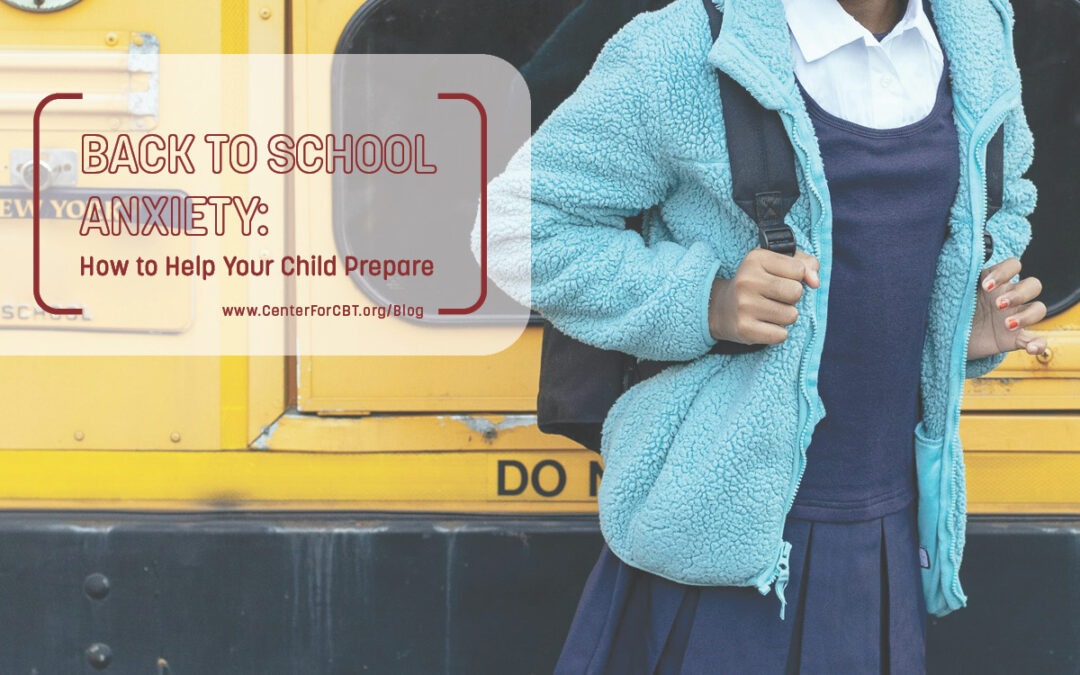Many children may experience feelings of anxiety as the end of summer vacation draws near. Generally, stressors and demands tend to be lower in the summer— no waking up early for school, no homework, and no studying for exams. Likewise, preferred activities like camp, playtime, trips, or socializing with friends tend to occur more regularly. As a result, the transition back to school in the fall can be difficult for kids as they shift away from leisurely activities to focus more on academic responsibilities.
Anxiety around the upcoming school year can make it even more challenging for children to adjust today-to-day schedule changes and increased demands., Knowing that they may encounter new situations and new people may heighten feelings of anxiety. Children may worry about being in a class without their friends, meeting new teachers, navigating a new school building, separating from parents, and more.
Although the new school year can be anxiety provoking for some children, there are strategies parents can use to help mitigate this anxiety and prepare children ahead of time.
Keep an Open Dialogue
One of the most important steps parents can take to prepare their children for the new school year is to maintain an open dialogue. During the summer, check in regularly with your child to see how they’re feeling about the school year. Check-ins can be casual, like “How are you feeling about going back to school?” They don’t have to be a big, serious discussion. Children are often more adept than it seems at picking up on their parent’s body language and emotions, so keeping a neutral tone of voice and approaching the conversation from a place of curiosity rather than wariness can be especially helpful.
If your child doesn’t express any concerns, try to go with the flow and avoid asking your child questions that could suggest you expect them to be nervous. Questions like “Are you worried about going to a new school this year?” can inadvertently communicate that they should be feeling worried. As a result, questions like this can increase your child’s anxiety. Let your child share how they are feeling and use what they share to help guide the conversation.
Validate Your Child’s Anxiety
If your child does express concerns, show your support and understanding by listening to their fears and validating their emotions. While your child’s worries may not seem like a big deal to you, they may be a big deal to your child. Letting them know that they are heard can make all the difference. One of the best ways you can do this is by practicing validation. In using this skill you can communicate to your child that their emotions, thoughts, or actions make sense and are understandable. Validation involves acknowledging what your child is feeling, understanding it for yourself, and communicating that understanding to them. Unless your child indicates otherwise, it is often helpful to provide validation before jumping to problem solving.
Problem Solving
When we get anxious, we tend to focus on the worry itself rather than what will happen next. This can lead children to avoid what they fear. The result is a short-term reduction in anxiety, but this can maintain or increase anxiety in the long term. To help resolve feelings of anxiety, children need to practice problem solving to help them face their fear.
Problem solving can go a long way in helping your child cope and reduce the likelihood of avoidance. This may look like talking through and strategizing about specific situations or by getting hands-on practice in advance when possible. Each child has their own unique worries and anxieties, but here are some problem solving examples for common worries:
- Social Situations: planning playdates with peers during the summer can give your child an opportunity to practice their social skills and help boost their confidence for the upcoming school year
- Academic Workload: you can help your child brush up on their reading, writing, math, and other skills with summer learning tips. Try to spend time reading each day, use flash cards, and practicing new skills they learned in the previous year
- Using a Locker: If your child is worried about using a locker for the first time, buy a combination lock and practice over the summer so that they can use it with ease once school starts
To best help your child, reflect on how back-to-school transitions went in previous years. Was there anything in the past that helped your child with the transition? Consider incorporating those moments into discussions with your child to remind them that they have overcome their anxieties before and help them face their fears.
What to Expect When Going Back School
Fear of the unknown can increase anxiety and thoughts of “what if.” Not having enough information before starting a new routine can create false alarms, where little problems feel bigger than they actually are.
Letting your child know what to expect about the upcoming school year ahead of time can help to reduce the number of unknowns they will be facing and help things feel less scary. Let them know what a typical day will look like and share the class schedule with your child if it’s available. Some schools offer a chance to tour the school and meet teachers prior to the start of the school year, which can help your child become familiar with a new space and new people, and decrease feelings of uncertainty about what’s to come. Rehearsing specific parts of the day such as drop off, walking to class, finding the bathroom or specific classrooms, or using a locker can also help.
Depending on the age of your child, it could also be beneficial to have your child practice these skills while you wait nearby, like at the end of the hallway or outside the room.
Helping Your Child Succeed at School
In addition to the tools above, you can help your child prepare for the new school year by getting them involved in back to school preparations, easing them into a new bedtime routine, and checking in with your child about how they’re feeling about the new school year. Remember, always validate their emotions before jumping into problem solving. It can also be helpful to check about the positives and what they’re looking forward to as well.
If your child’s anxiety feels too challenging to manage despite your best efforts, you may consider seeking professional support. A good CBT clinician can help provide you and your child with tools to manage and cope with anxiety. By working together as a team, you can help your child find success and reach their full potential.


